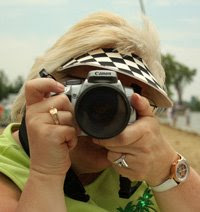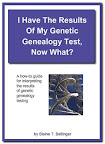
I made a visit to the
mitosearch.org web site yesterday. This is the public database for mtDNA results. It doesn't matter which company did your testing, all are welcome to submit their results here.
This site is very straightforward and easy to use. First you register for a user account and then you can enter your information and check to see if anyone else is a match for your mtDNA. It's free :-)
I registered and entered my test results. Then I went to the "Search for genetic matches" page. You can choose how specific you want your search to be. In my case, I really only wanted to look at exact or almost exact matches. Haplogroup H is the largest group of the seven in Europe so there has got to be one whole heck of a lot of people in this group. I didn't want to have to sort through a lot of not-so-close matches.
I entered the user ID I was assigned, selected "Only compare me to users that tested both HVR1 and HVR2, factoring both into the comparison." and clicked on search. I got 110 results that are similar to mine, 29 were matches on HRV1 and + or - 1 on HRV2. There were 12 that were exact matches for my haplogroup, HRV1 and HRV2.
You can click on the user ID for each registrant and look at the information they provided. Some provided a good deal of information and even uploaded their GEDCOM file. Others provided nothing more than a name to be contacted.
I was interested in where the 12 exact matches for my mtDNA results could trace their lineage to. I was hoping to find that they were from an area of Poland close to my maternal ancestral village. Here's the breakdown of what I found.
Those who could trace their lineage to Europe and the year of birth of their oldest maternal ancestor:
East Prussia, Germany 1779
Leitrim, Ireland 1830
Greenock, Refrewshire, Scotland 1835
Netherlands 1779
Germany, late 1700s
Prussia, Germany (date not given)
Those whose lineage was in the United States and the year of birth of their oldest maternal ancestor:
Cape Girardeau, MO 1869
South Carolina 1793
Edmonson, KY 1803
Pennsylvania (date not given)
Two users gave no information.
If I go out to include those with + or - 1 variation from mine I can add:
Czech Republic 1820
Italy 1882
Wales 1842
Italy 1844
Montreal, Canada 1878
Belgium 1585
Ukraine 1855
England 1819
Indiana 1808
Iowa 1923
Six users gave no information.
These were certainly not the results I was expecting to see, but then, what do I know? I'm a newbie at this mtDNA stuff! LOL!
Well, apparently there are lines of my mtDNA scattered across the U.S. and Europe. I find that quite fascinating. The longer I ponder it, the more amazing it is to me.
I can contact the descendants of these oldest maternal ancestors if I want to. I don't think I do. Perhaps I'll change my mind in the future but for now I can't think of anything I want to ask them. It's enough just to know they are out there...
One thing I did notice was that of those who were tested for subclades (DNA Heritage, where I had my test done, does not test for this), all were in subclade H11. I checked with my good buddy
Blaine on this and he said that if my exact matches are all H11 it strongly suggests that I belong to this sub-haplogroup too. So I'm going to go with that assumption for the time being. It's a good thing to know, I think. With a haplogroup as big as H it seems like it would help to have subclades to break it down a bit further.
My opinion: This is a database plain and simple. It does what it's designed to do without any distracting ads. There is no real information provided about hg H on this site but I found my visit to be an interesting one. I hope that everyone will add their mtDNA test results here so that we can all learn more about each other.






